The One Produce You Should Never Wash, Say Experts
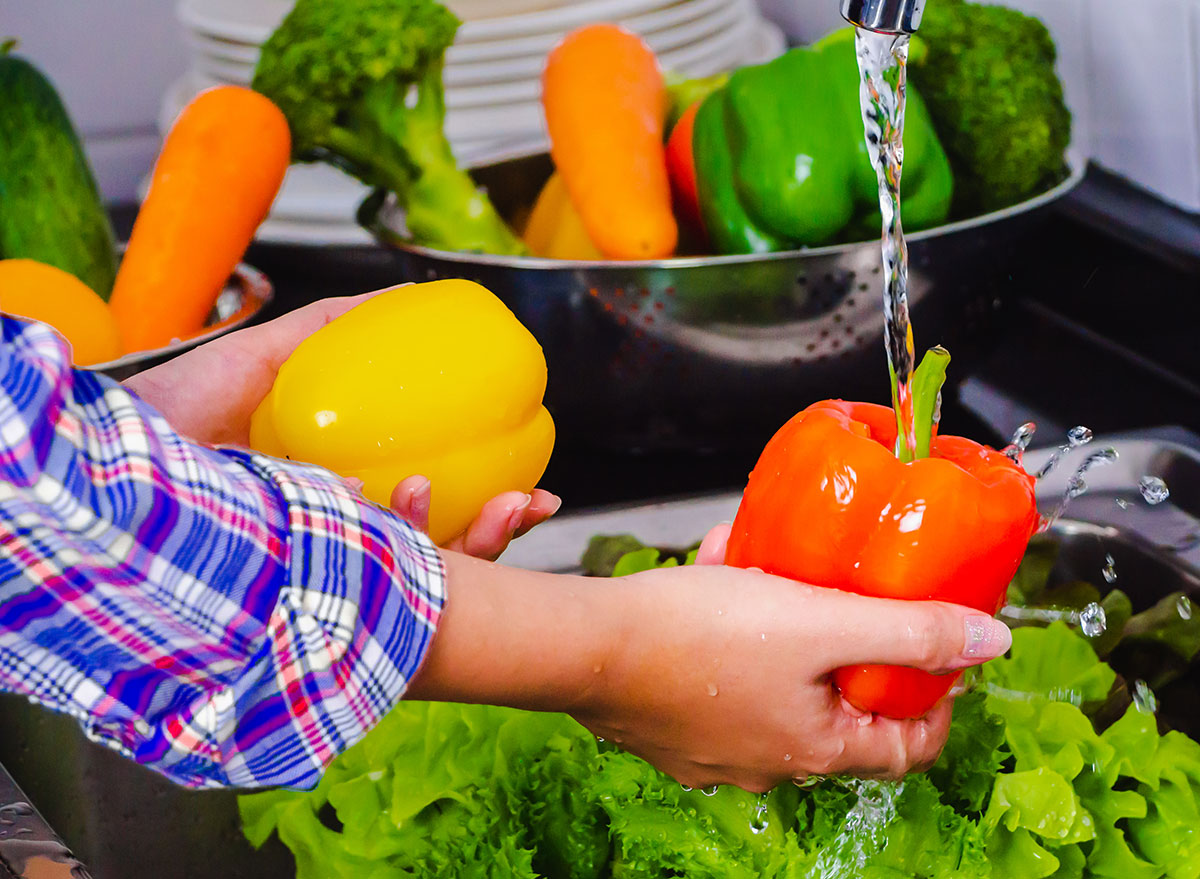
Whipping up any meal with fresh ingredients usually involves a fair amount of peeling, chopping, slicing, and rinsing, especially when vegetables are involved. But before you bring any produce ingredients over to the sink, you might want to think twice. That's because experts warn there are some vegetables that you should never wash before eating. Read on to see what you shouldn't be rinsing after taking it out of the fridge.
Never wash pre-washed lettuce or greens before eating them.
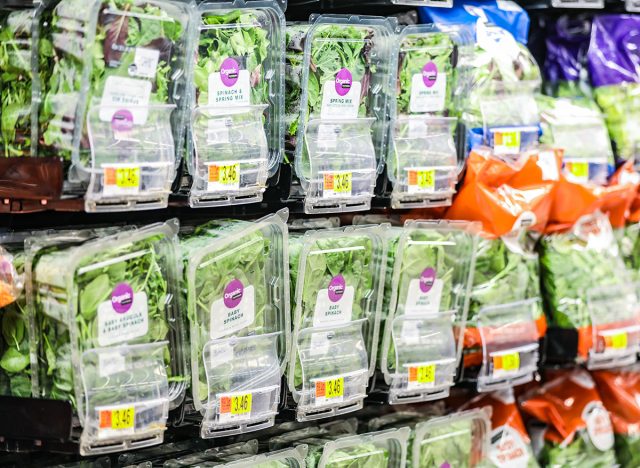
It's pretty common knowledge that your vegetables need a quick rinse before you chop them and add them to your dish, even if they already appear to be clean. But no matter how steadfast your kitchen hygiene may be, any leafy greens that come prepackaged in a container that says "triple washed" shouldn't get a pre-prep wash, experts say.
"Washing them again [at home] can actually increase the risk for leafy greens to pick up bacteria from your sink, countertops, cutting boards, knives, colanders, salad spinners, bowls, or other items or surfaces in your kitchen the greens might come in contact with during the washing process," Neva Cochran, RDN, a dietitian, nutrition communications consultant, and an advisory panel member to the Leafy Greens Marketing Agreement, told Eating Well.
Your kitchen is likely to contaminate pre-washed greens as you wash them.
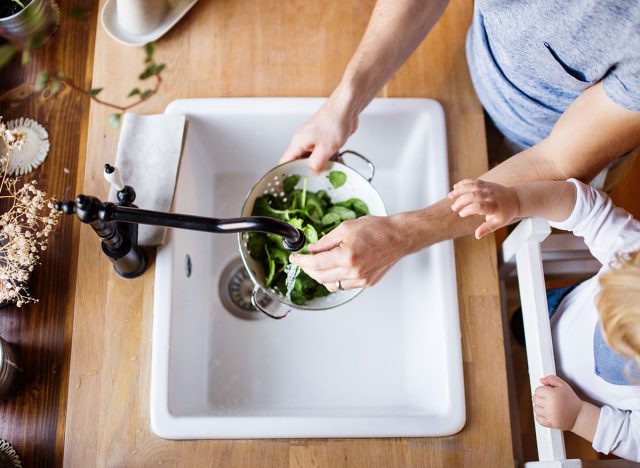
Nobody likes the idea of eating contaminated food prepared in a messy kitchen. But when it comes down to it, even the most immaculately maintained home cooking spaces are nowhere near the cleanliness standards of the sites where your prepackaged greens are processed. "Leafy greens in sealed bags labeled 'triple washed,' 'washed' or 'ready-to-eat' are produced in a facility inspected by a government regulatory authority and operated under Good Manufacturing Practices," Cochran tells Eating Well.
Other experts point out that modern processes and techniques have made it easier to ship ready-to-eat leafy produce that is safe to eat. "Pre-washed greens are treated with a mix of water and a food-grade sanitizing agent, like hydrogen peroxide or chlorine," Randy Worobo, PhD, associate professor of food science at Cornell University, told Real Simple. The mixture, which the Environmental Protection Agency (EPA) says poses no risk at such low levels, "reduces and prevents the spread of bacteria from the produce surface."
For more food preparation tips sent right to your inbox, sign up for our daily newsletter.
Just because you're not rinsing pre-washed greens doesn't mean you shouldn't be taking any precautions.
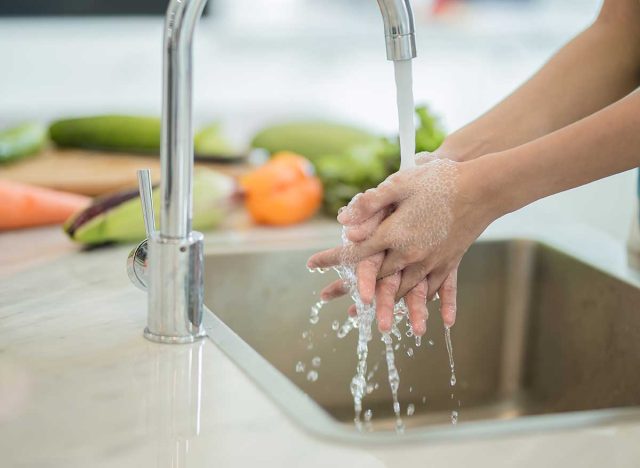
Even though that lettuce, spring mix, or arugula might be good to go from the package, there are still a few tried and true rules you should follow when using them. As always when preparing food, wash your hands for 20 seconds with soap and hot water before handling the produce. It's also best to make sure any surfaces such as cutting boards or mixing bowls have been cleaned or sanitized before transferring your greens onto them. And remember that your kitchen sink itself can sometimes be the place most likely to contaminate your ingredients, so be sure to clean it thoroughly before you start to cook.
The CDC says you should also never wash meat or poultry before cooking it.
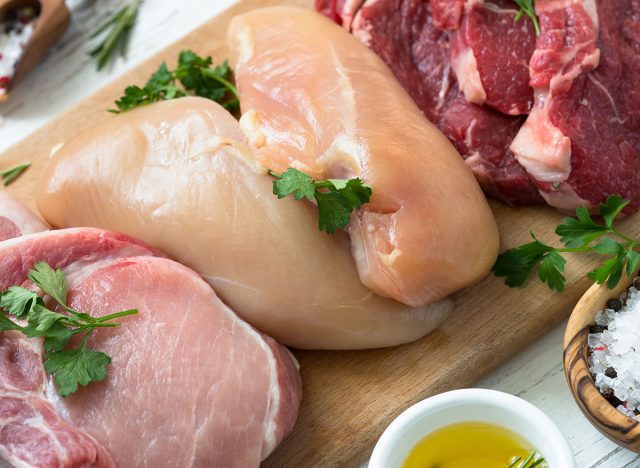
But it's not just pre-washed leafy greens that you shouldn't wash during meal prep. According to the Centers for Disease Control and Protection (CDC), rinsing off meat, poultry, or eggs is also a bad idea. "Washing raw meat, chicken, turkey, or eggs can spread germs to your sink, countertops, and other surfaces in your kitchen," the agency warns. "Those germs can get on other foods, like salads or fruit, and make you sick."
The U.S. Department of Agriculture (USDA) says it's no longer necessary to rinse off your meat or poultry thanks to current commercial washing techniques. While washing "to remove dirt, slime, fat or blood may have been appropriate decades ago when many slaughtered and prepared their own food, the modern food safety system doesn't require it," the USDA says. According to the agency, meat and poultry are cleaned thoroughly enough during processing. Therefore, any further washing is an unnecessary added risk.
This story has been reprinted with permission from Best Life.








